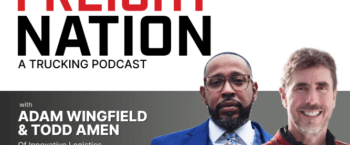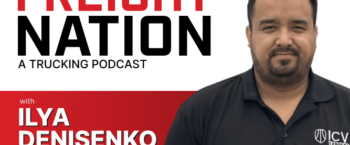Top 10 Tips for New Owner-Operators

What are you waiting for?
Make more money starting now.
It’s common for truckers to crave more independence and make the transition from driving for someone to driving for themselves. Everybody wants to be their own boss, and there are a lot of things to consider before becoming an owner-operator. Below are 10 tips for new owner-operators to help you find success if you start your own trucking company.
1. Determine your work habits NOW.
Good work habits are critical to your success, and that means asking some tough questions:
- Are you comfortable driving over-the-road for long periods of time? Although it isn’t always necessary to be gone for weeks (or months) at a time, it is common. Trucking is nothing if not a lifestyle choice; decide if the call of the open road is the right lifestyle choice for you, because it will tax you physically, emotionally, and mentally.
- How long are you okay being away from home? Figure out now who’s going to get your mail and respond to anything urgent. If you own a house and live alone, someone should check on it at least once a week to ensure a water line doesn’t break, the furnace is working, the roof is intact, etc. Arrange for a lawn care service and any other on-going maintenance your house may need.
- What family obligations do you have? If you are in a relationship, make sure your significant other understands and is okay with your driving commitments. Be ready to work your driving schedule around custody agreements, and prepare mentally to miss major milestones and holidays on occasion.
- Can you balance driving with managing a business? If you want to be your own boss, you have to do everything a boss would, PLUS drive the truck. You have to stay on task, complete paperwork, and find your own loads. (There are tools to help. Check them out!)
Schedule an appointment for a physical, and have your blood drawn for a basic metabolic panel (BMP). A physician can assess your general overall health, and a BMP will tell the doctor more about your heart, glucose levels, organs, and more. Maintaining a healthy lifestyle is hard when you’re on the road for long stretches of time. Make sure you don’t have any underlying medical conditions, and come up with a plan to eat healthy and exercise when you’re on the road.
Read about the importance of health screenings for long-haul truck drivers.
3. Have a plan.
Creating a business plan before you start as an owner-operator will help you focus your efforts, formalize goals, and determine a long-term plan for your trucking company. Business plan templates can be found through an internet search, but any good plan should include:
- An overview of your business
- A description of the service(s) you’ll provide
- Your ideal customers
- How you’re different from the competition
- Your experience in the field
- A financial outlook for the future.
Creating a business plan will also help if you’re seeking a business loan to get started as a new owner-operator.

4. Decide if leasing is for you.
You’ll need to decide if you want to lease onto a company or become your own authority and find your own loads. There are basically three options:
- Lease-Purchase Operator: Sign a lease or a lease-purchase agreement to get a truck through a carrier or third-party leasing company. This is the easiest way to get a truck with little or no down payment or credit, but many drivers sign a lease before they’re ready and get saddled with expensive equipment. Some contracts restrict decision-making, and others make it difficult to take your equipment to other carriers.
- Leased Owner-Operator: Buy your equipment (outright or through a loan), and lease to a carrier to use their operating authority. You have control over the equipment and who you lease to, but you can’t walk away from the equipment free and clear. You’ll face severe financial consequences if you default on the loan.
- Carrier: Get your own operating authority and become a motor carrier. There’s higher profit margins and more freedom, but it’s also more work. You develop your own customer base and solicit freight from shippers or work through load boards with a cut going to the broker who helps facilitate.
Truckstop.com can help you get your operating authority through ITS Financial Services. Call 1-866-812-9675, option 2.
5. Choose the right truck.
Do you buy an expensive new truck that comes with a warranty? Or a used truck that costs less but you may have to put money into? Do you buy a reefer or a flatbed? Start researching the benefits of used versus new trucks, and figure out what kind of lanes you’ll be running to get the right truck for the job. This is the most expensive part of becoming an owner-operator, and you want to make the best decision for you.
Once you’ve narrowed down your truck options, research fuel economy and maintenance so you know what to expect once you start running. This is a long-term financial commitment, so do your research! It will save you time and money in the long run.
6. Talk to an accountant.
You’ll need to figure out a business structure, have a system for taxes, and a method for record keeping. Meet with a reputable accountant, and talk to them about the business you want to create. They can help you file the appropriate documents and set you up for success by figuring out the business structure that’s right for you. They can also help with a quarterly tax filing system to ensure you comply with the International Fuel Tax Agreement (IFTA) and any other taxes associated with your business.

7. Figure out a budget.
Help ensure your financial success by creating a personal budget AND a business budget. Part of succeeding as an independent owner-operator means making money to support yourself, your family, and your business.
- A personal budget will include mortgage or rent, utilities, retirement savings, etc.
- A business budget will include fuel costs, certifications and permits for staying on the road, taxes, truck maintenance, insurance, etc.
You need both!
Start using a software program (like QuickBooks) to keep track of all spending (fuel, health insurance, food, etc.). Keeping track now will make short work of financial tasks later.
8. Have money in the bank.
You should have at least 60 days of operating costs saved, and pay off as many debts as you can so you start with fewer things to worry about. Anything could come up – from sustaining a physical injury to your truck breaking down. Having money in the bank will get you through many unexpected problems, as well as provide you with cash to cover truck fuel, maintenance, etc., until money starts coming in.
Having some cash in the bank and debts paid off will improve your credit rating if you’re taking a loan to help with start-up costs.

9. Make some business decisions.
Decide now how you’re going to complete some of the day-to-day tasks that come with a business.
- Figure out how you’re going to invoice customers. An easy solution is a transportation management system (TMS) like ITS Dispatch which creates invoices and BOLs, automates IFTA reporting, provides detailed reporting, and more.
- Decide on a factoring company. Factoring is when a business sells its invoices to a third-party financial company, or “factor,” who collects payments on the business’s behalf. It means you can get paid faster than the standard 30-60 days it usually takes. Truckstop.com Factoring specializes in factoring for truck drivers.
10. Get a good load board.
If you’re going to be tackling the spot market on your own, you’ll need a load board you can depend on. Not all load boards are created equal – and if you’re not moving, you’re not making money. Use a load board that can help you find the right loads fast and keep your truck rolling. It’s easier than ever thanks to cutting-edge tools like the Truckstop.com Load Board – now better-than-ever, offering instant booking of real loads with no negotiations required using our Book It Now tool.
To learn more about becoming an owner-operator in today’s market, and for more tips for new owner-operators check out this blog post.
Or, learn more about buying a truck.
Learn more about the Truckstop Load Board.
Topics:

Find out how our platform gives you the visibility you need to get more done.
Get helpful content delivered to your inbox.
Schedule a demo.
Find out how our platform gives you the visibility you need to get more done.





